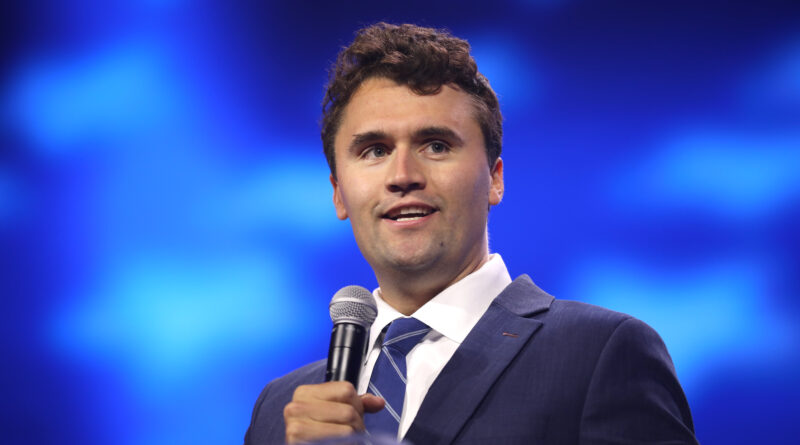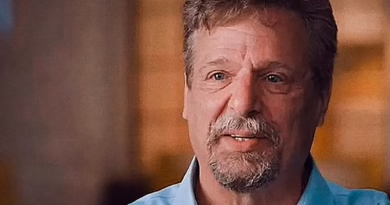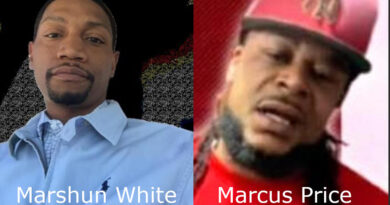Charlie Kirk Murder in Utah
On September 10, 2025, a tragic act of violence unfolded on the campus of Utah Valley University in Orem, Utah. Charlie Kirk, a nationally recognized conservative commentator, activist, and founder of Turning Point USA, was assassinated while addressing a large outdoor audience. His death shook the political landscape of the United States, igniting debates over political polarization, security at public events, and the growing specter of political violence in America. The killing of Kirk was not merely the loss of one individual but a watershed moment that revealed the volatility of America’s cultural and political divides.
Background of Charlie Kirk
Charlie Kirk was born in 1993 in the suburbs of Chicago. From a young age, he was drawn to conservative politics, quickly developing a reputation as a charismatic speaker and organizer. At just 18 years old, he founded Turning Point USA (TPUSA), a nonprofit dedicated to promoting conservative values on college campuses. His leadership expanded TPUSA into a nationwide network with thousands of student chapters.
Kirk also became a prominent media personality, hosting The Charlie Kirk Show, a daily podcast and radio program where he blended political commentary with cultural analysis. Beyond TPUSA, he launched Turning Point Action, a political advocacy group aimed at grassroots organizing and influencing elections. For over a decade, Kirk built a career as both an activist and a provocateur, often finding himself at the center of heated national debates.
By 2025, Kirk had become one of the most visible conservative figures in the country, frequently appearing on national television, testifying before government panels, and headlining political events across the nation. His influence reached millions of young Americans, both admired by his supporters and vilified by his opponents.
The Setting at Utah Valley University
Utah Valley University had invited Kirk to participate in a campus speaking engagement, part of a broader tour organized by TPUSA and its affiliates. The event was held outdoors on the university’s main quad, with a large stage erected for Kirk’s address. Security was present but light, consistent with many of his past public appearances, where Kirk favored accessible, open-air events to project transparency and engagement with the public.
Hundreds of attendees, including students, faculty, and members of the local community, gathered to hear him speak. The mood was electric, with supporters waving flags and holding placards, while critics of his politics were also present, some engaging in peaceful protests.
The Attack
As the event unfolded, Kirk took the stage and began his remarks. Approximately 20 minutes into his address, a shot rang out. Witnesses reported hearing a loud crack that many initially mistook for fireworks or a sound malfunction. Within seconds, it became clear that Kirk had been struck.
The single bullet hit Kirk in the upper body, and he collapsed on stage before his security team rushed to shield him. Attendees screamed, and panic spread throughout the crowd. Law enforcement officers on site immediately initiated lockdown procedures while paramedics attempted to provide aid. Despite their efforts, Kirk succumbed to his injuries shortly after being transported to a nearby hospital.
The suspect fled the scene in the immediate chaos, but campus and city police launched a rapid manhunt. Within hours, authorities apprehended a man named, Tyler Robinson, believed to be responsible, linking him to threatening communications sent in the days leading up to the event.
The Suspect and Motive
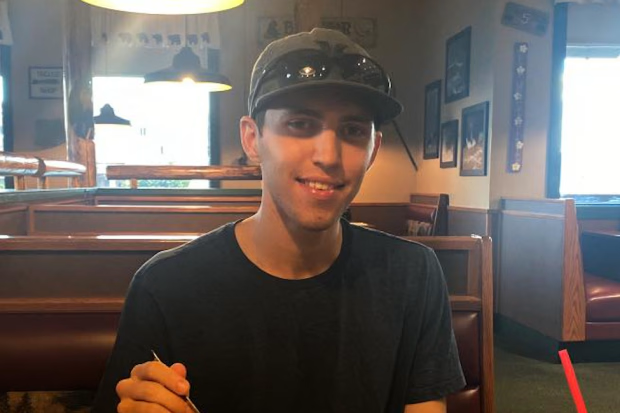
Initial investigations revealed that the suspect, Tyler Robinson, had been radicalized online and harbored a deep animosity toward Kirk’s political ideology. Reports suggested that the individual had posted a confession on social media shortly after the shooting, writing messages that identified himself as the perpetrator.
Authorities later confirmed DNA evidence and a written note expressing intent to commit the act, removing doubt about his culpability. Though the suspect’s family identified as Republicans, they reported that he had grown increasingly hostile toward conservative figures, including Kirk, in the months prior. His political motivations remain a central focus of the investigation, but early reports characterized the killing as a politically motivated assassination.
Immediate Aftermath
News of the shooting spread rapidly across the nation. Within minutes, cable news channels broke into regular programming, and social media exploded with shock, grief, and outrage. Utah Governor Spencer Cox condemned the murder as a political assassination, calling for unity against violence regardless of ideology. President Joe Biden and former President Donald Trump both issued statements, expressing sorrow at the tragedy and warning about the dangers of political hatred.
At Utah Valley University, the campus was placed on lockdown, with events suspended as investigators combed the site. Students who attended the event described chaos, confusion, and horror at seeing a national figure gunned down before their eyes.
National Reaction
Across the United States, reactions to Kirk’s murder reflected the deep partisan divides that characterized American politics in 2025. Supporters of Kirk mourned him as a martyr for conservative values, while critics—though condemning the act—argued that his rhetoric had also contributed to a polarized atmosphere.
Vigils were held in major cities, including Phoenix, Dallas, and Washington, D.C., where mourners lit candles and prayed for his family. In some areas, tensions flared when counter-protesters clashed with Kirk’s supporters, highlighting how even his death could not escape the nation’s divisions.
Media coverage was wall-to-wall, with pundits debating whether the killing marked an escalation in political violence similar to the shooting of Congressman Steve Scalise in 2017 or the attempted assassination of President Ronald Reagan in 1981.
Security Concerns
The murder of Charlie Kirk brought renewed attention to security protocols at public events featuring political figures. Critics questioned why Kirk’s appearance at Utah Valley University was not held indoors with controlled entry points and metal detectors. The choice of an outdoor stage, accessible from multiple directions, left vulnerabilities that the shooter exploited.
Event organizers defended their decision, stating that Kirk often insisted on open, approachable settings that encouraged engagement. Still, law enforcement agencies nationwide began reviewing security procedures for high-profile figures following the tragedy.
Impact on Turning Point USA and Turning Point Action
With the death of its founder, Turning Point USA faced an existential crisis. Kirk’s leadership and vision had been the driving force behind the organization, and many questioned whether it could survive without him.
In the immediate days following his death, Erika Kirk, his wife, released a statement pledging that the mission of TPUSA would continue. Donations surged, and interest in new campus chapters reportedly spiked, as supporters vowed to honor Kirk’s legacy by continuing his work. Turning Point Action also saw a wave of renewed grassroots energy, with precinct leaders dedicating themselves to the cause in his name.
Cultural and Political Significance
The assassination of Charlie Kirk underscored the dangers of America’s intensifying political climate. It highlighted how public figures—especially polarizing ones—face risks that go beyond verbal attacks and online hostility.
For conservatives, Kirk’s death became a rallying cry, symbolizing the cost of standing up for their beliefs in a hostile environment. For liberals, it raised urgent questions about the toxic environment that fuels violence and how to de-escalate political tensions.
Regardless of perspective, the murder of Charlie Kirk became a defining moment of 2025, shaping discourse around free speech, security, and the responsibilities of leaders in a divided nation.
Legacy of Charlie Kirk
Though his life was cut short at the age of 32, Kirk left behind a substantial legacy. He transformed a small grassroots project into one of the largest conservative youth organizations in America. He authored several books, hosted a nationally syndicated show, and helped shape a generation of young conservatives.
His death, while tragic, ensured that his name would remain etched in the annals of American political history. Whether viewed as a visionary, a provocateur, or a polarizing figure, Charlie Kirk’s impact cannot be denied. His murder may have silenced his voice, but it amplified the conversations he started—conversations that will continue to reverberate for years to come.
Timeline of the Murder of Charlie Kirk
Before the Event
- Early 2025 – Charlie Kirk continues his nationwide speaking tour, promoting Turning Point USA and Turning Point Action. He schedules a major outdoor address at Utah Valley University (UVU).
- Weeks prior – The suspect allegedly begins posting hostile messages online, expressing political animosity toward Kirk. Investigators later uncover threatening texts and writings that suggest intent to harm him.
- September 9, 2025 – The suspect reportedly prepares a note and final communications indicating his plan.
Day of the Attack – September 10, 2025
- Afternoon – Crowds gather at UVU for Kirk’s speech. Security is present but not as extensive as for higher-level government officials. The event is staged outdoors on the main campus quad.
- Evening, around 7:00 PM local time – Kirk takes the stage to deliver his address. Hundreds of attendees, including students, faculty, and community members, fill the audience. Some counter-protesters are also present.
- Approx. 20 minutes into the speech – A loud gunshot rings out. Kirk is struck by a single bullet in the upper body. Chaos breaks out as attendees scream and rush for safety.
- Immediate aftermath – Security rushes Kirk off stage. Medics attempt resuscitation. Law enforcement initiates lockdown procedures and begins searching for the shooter.
Medical Response
- 7:30 PM – Kirk is rushed to a nearby hospital by paramedics. Despite emergency measures, he succumbs to his injuries. News begins to leak that his condition is critical.
- 8:15 PM – Kirk is officially pronounced dead.
Law Enforcement Response
- Evening of September 10, 2025 – A manhunt is launched. Authorities identify the suspect through eyewitness accounts and digital traces.
- Late night, September 10 – Police apprehend the suspect. Investigators discover a confession posted on social media, a written note, and DNA evidence tying him to the scene.
September 11, 2025
- Morning – Utah’s governor calls the killing a political assassination. The president, former presidents, and national leaders across the spectrum issue statements of grief and condemnation.
- UVU – Campus remains closed for investigations. Vigils begin forming around the university, with students placing flowers and candles at makeshift memorials.
- National reaction – Media coverage dominates the day’s news. Vigils and protests occur across the country.
Following Days
- September 12–15, 2025 – Vigils spread nationwide. Supporters frame Kirk as a martyr for free speech and conservative activism. Counter-narratives emerge about the risks of inflammatory rhetoric.
- Investigations continue – Police reveal that the suspect acted alone. They confirm the political motivations, citing online posts and hostile communications.
Weeks After
- Late September 2025 – Turning Point USA and Turning Point Action release statements pledging to continue Kirk’s work. Erika Kirk speaks publicly, vowing that her husband’s mission will not end with his death.
- October 2025 – National debates intensify over security at political events, political polarization, and the growing threat of violence tied to ideology. Memorial services are held in Chicago (his hometown) and Phoenix (TPUSA headquarters).
This timeline condenses the flow of events while giving a clear picture of who, what, when, and where everything unfolded.
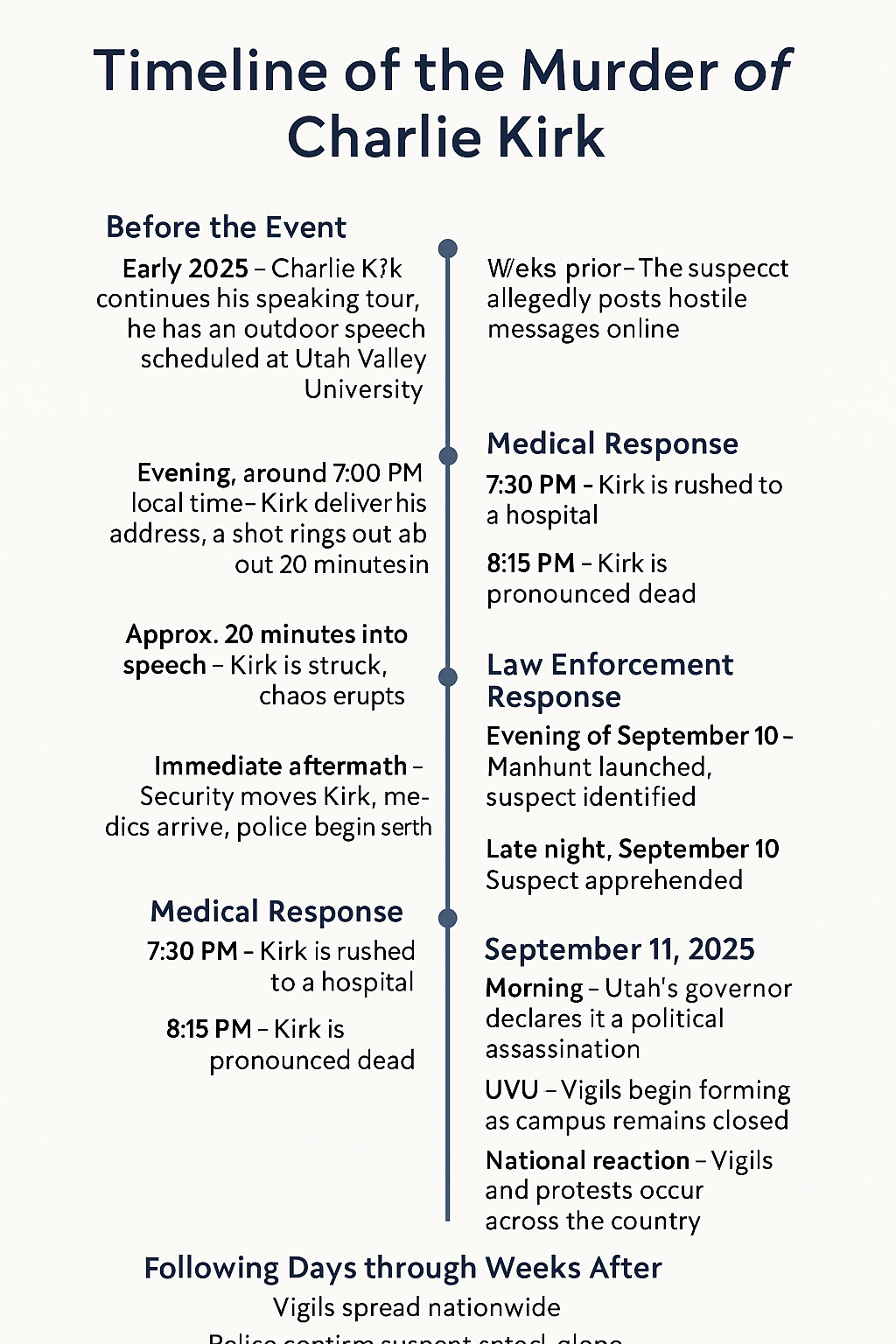
Conclusion
The murder of Charlie Kirk on September 10, 2025, at Utah Valley University was not just an isolated act of violence but a symbol of America’s fragile political environment. It forced the nation to confront the consequences of division, the necessity of safeguarding public figures, and the urgent need to foster dialogue over hostility.
Kirk’s legacy will endure through the movements he founded, the millions he influenced, and the national reckoning his death inspired. His assassination remains one of the most shocking political crimes of the decade, a grim reminder that the cost of unchecked polarization can be bloodshed.
Discover more from City Towner
Subscribe to get the latest posts sent to your email.

